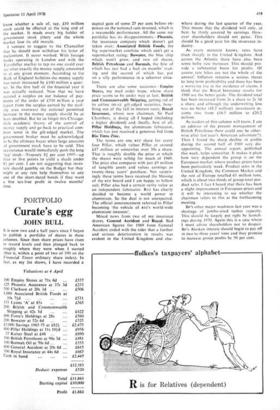PORTFOLIO
Curate's egg
JOHN BULL
It is now two and a half years since I began to publish a portfolio of shares in these columns. Since then share prices have risen to record levels and then plunged back to roughly where they were when I started (that is, within a point of two of 390 on the Financial Times ordinary share index). In fact, as my list shows, I have recorded a
Valuations at 4 April 100 Empire Stores at 71s 6d ... 125 Phoenix Assurance at 37s 3d 500 Clarkson at 20s 3d 1,000 Associated British Foods at 10s 74d 133 Lyons 'A' at 85s 200 British and Commonwealth Shipping at 42s 3d ...
400 Forte's Holdings at 28s 200 Bowater at 52s 6d £3,000 Savings 1965-75 at £824 ...
600 Pillar Holdings at 31s 104c1 15 Kaiser Steel at £46 100 British Petroleum at 96s 3d ...
100 Burmah Oil at 70s 6d 600 General Accident at 20s 6d ...
300 Royal Insurance at 44s 6d ... Cash in hand £12,383
Deduct: expenses £520
Total £11,863 Starting capital £10,000 Profit £1,863 £357 £233 £506 £531 £565 £422 £560 £525 £2,475 £956 £690 £481 £353 £615 £667 £2,447
capital gain of some 23 per cent before ex- penses on the notional sum invested, which is a reasonable performance. All the same my portfolio has its disappointments—Phoenix, the insurance company which doesn't get taken over; Associated British Foods, the big supermarket combine which can't get a supermarket rating; Bowater, the blue chip which won't grow, and two oil shares, British Petroleum and Burmah, the first of which has just had a bad six months' trad- ing and the second of which has put on a silly performance in a takeover situa- tion.
There are also some successes—Empire Stores, my mail order hope, whose share price seems to be under way at last: British and Commonwealth Shipping, getting rid of its airline (wn); gilt-edged securities, bene- fiting out of the fall in interest rates; Royal Insurance, whose new chairman, Sir Paul Chambers, is doing all I hoped (including a higher dividend) and, finally, best of all, Pillar Holdings, the aluminium fabricator, which has just received a generous bid from Rio Tinto Zinc.
The terms are one n'rz share for every four Pillar, which values Pillar at around £47 million or somewhat over 30s a share. That is roughly double the price at which the shares were selliPg for much of 1969. The price also compares with just £9 million of tangible assets and values earnings as twenty-three years' purchase. Not surpris- ingly these terms have received the blessing of the wrz board and I am happy to follow suit. Pillar also had a certain rarity value as an independent fabricator. R-rz has clearly decided to become a world power in aluminium. So the deal is not unexpected. The official announcement referred to Pillar becoming 'the vehicle of RTZ'S world-wide
aluminium interests'. •
Mixed news from two of my insurance shares, General Accident and Royal. Bad American figures for 1969 from General Accident ended with the rider that a further and serious deterioration in results was evident in the United Kingdom and else-
where during the last quarter of the year. This means that the dividend will only, at best, be thinly covered by earnings. How- ever shareholders should not panic. This should be a good year for the insurance in- dustry.
As every motorist knows, rates have risen sharply in the United Kingdom. And across the Atlantic there have also been some hefty rate increases. This should pro- vide a substantial boost for profits. Of course rate hikes are not the whole of the answer. Inflation remains a serious threat to long-term profitability and there has been a worrying rise in the incidence of claims. I think that the Royal insurance results for 1969 are the better guide. The dividend total has been increased from 2s a share to 2s 3d a share, and although the underwriting loss was no better (£8.2 million), investment in- come rose from £16.5 million to £20.2 million.
As readers of this column will know, I am an admirer of the present management of British Petroleum (how could one be other- wise after last year's American adventure?). Thus I found the sharp decline in profits during the second half of 1969 very dis- appointing. The annual report, published this week, helps somewhat. It makes it plain how very dependent the group is on the European market, where product prices have been particularly weak. Product sales in the United Kingdom, the Common Market and the rest of Europe totalled 63 million tons, which is about two-thirds of group total pro- duct sales. I fact 1 heard that there has been a slight improvement in European prices and it will be interesting to see whether the chairman refers to this at the forthcoming meeting.
BP'S other major weakness last year was a shortage of jumbo-sized tanker capacity. This should be largely put right by launch- ings during 1970. Again this is a case where I must advise shareholders not to despair. Bp's Alaskan interest should begin to pay off in two to three years' time and they promise to increase group profits by 50 per cent.
ffolkes's taxpayers' alphabet
R is for Relatives (dependent)






































 Previous page
Previous page